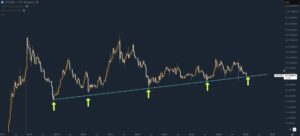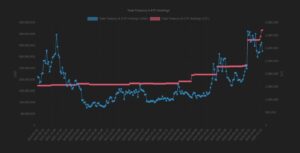As stocks, oil and gold prices swayed indecisively, one asset continues to outperform all others as it taps $14,500, surpassing 2019 highs.
The price of bitcoin has surged over 112% year-on-year tapping $14,500 on Thursday. That is the highest level since January 2018, when bitcoin was coming down from its record high of $20,000 set in the previous month.
Many investors agree that the renewed interest in bitcoin is tied to its potential as a hedge against inflation and its ‘gold 2.0’ properties.
Bitcoin’s proponents have touted that prospect for years, mainly because the bitcoin network has a set limit on the number of units that can be created: 21 million. With the lockdowns wrecking havoc on global economies, government and central banks have opened the fiat taps to spend trillions in an effort to prop up financial markets and hopefully – economies. This has revived fear that inflation will surge in the coming years, which is winning new bitcoin converts each day.
 Edit Image
Edit Image
Some of such converts include publicly traded companies like Square and MicroStrategy, both of which have put millions down on bitcoin as a hedging instrument in their corporate treasuries.
Attracting new investors has been a long-time goal for the crypto industry. Since the 2017 $20,000 high, the bitcoin industry has built out infrastructure for professional investors, creating everything from exchange-traded funds to options markets and custodial solutions.
Although the Securities and Exchange Commission has yet to officially approve a bitcoin ETF, other services are in place. And investors are beginning to embrace them.
“You had all these rails for institutional capital to come in,” said Matthew Hougan, chief investment officer at BitWise Asset Management. “Then you had the sharp catalyst: the response to the pandemic and concerns about inflation.”
BitWise, which offers crypto-based index funds to financial advisers, hedge funds and family offices, saw its assets under management rise to $100 million as of Wednesday from about $70 million in June, Mr. Hougan said.
Meanwhile, in the third-quarter, Grayscale investments reported inflows of $1 billion into the trust-fund, raising its total assets under management to $5.9 billion. That growth has accelerated. On Wednesday, the company revealed that its assets under management had grown to $7.6 billion.
Options activity is also on the up. In late 2019, the number of bitcoin futures contracts traded on the Bakkt platform averaged about 1,300 a day. By September, that average had surged to 8,700.
Bakkt, a bitcoin options market founded by Intercontinental Exchange Inc., has been attracting traditional hedge funds and trading firms and even more recently mainstream brokerage houses, per Bakkt President Adam White.
 Edit Image
Edit Image
“They’re taking a hard look at crypto and bitcoin,” he stated.
Bitcoin’s potential use as a payment option even got a surprising boost earlier in October when PayPal said it would allow users to directly buy and sell bitcoin in their digital wallets. In 2021, the payments company will expand the service to Venmo and allow the 26 million merchants that use PayPal to accept bitcoin for payment.
Together, these developments have cemented bitcoin’s push towards a total market cap of $267 billion from about $130 billion in January.
To put this in perspective, these inflows are minuscule when compared with wider capital markets. US stocks alone are worth nearly $52 trillion, but for the burgeoning digital currency, it’s an increase that hasn’t gone unnoticed.
“The market is just not that big,” Mr. Hougan said. “A few institutions making an allocation is significant.”
As institutions pour into the king cryptocurrency, this unanimous vote of confidence could spur bitcoin to surpass all time highs before the year-end.
Subscribe to the semi-weekly newsletter for regular insight into bitcoin and crypto. Go on. It’s free.
Join the telegram channel for updates, charts, ideas and deals.
Did you like the article? Share it!


